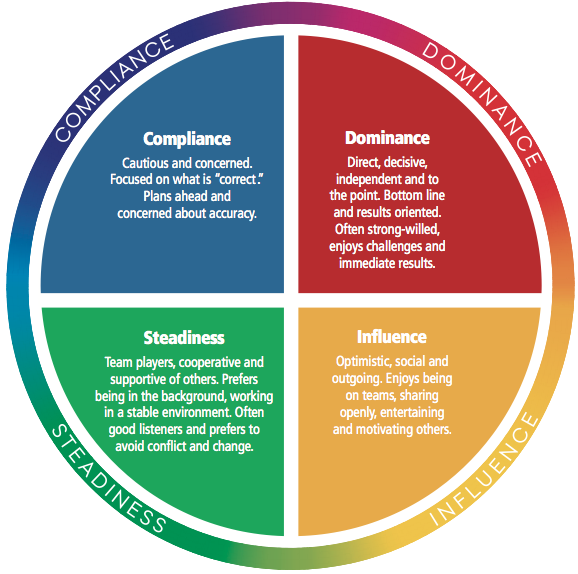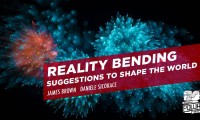I have mentioned DiSC profiles in the past, but never really given it much clarity on the blog. My reason for writing this is really due to some changes in approach from a management perspective, but they are equally beneficial to understand from a social engineering perspective. The simple reason for the benefit is, to continue to improve your influencing capability, it is beneficial to understand and be aware of the communication style preferred by the person you are interacting with. Obviously you increase your understanding and fine turn over time, but equally in a short period of time you can (hopefully with aid of the information below) identify the communication / personality style of the person in question, so you can contextualise your communication in the most effective way.
So what are these DiSC profile things? Its essentially a tool / process to help you understand your behaviours, but most importantly helping you realise how your behaviours are different to others. The aim is to lead you to conclusions to play to your strengths and also communicate / flex your style to complement the behaviours / styles of others to achieve your objective. Essentially your takeaways from understanding your profile is understanding how you handle conflict, how you are motivated, what stresses you and how you are motivated into action. Knowing this helps you minimise conflict, improve influence and communication, and ultimately just be a more effective person.
What does DiSC stand for? Dominance, Influence, Steadiness and Conscientious.
In the following section I am going to provide an overview of how you can potentially spot the characteristic profile most preferred in someone, what they want and how you can use this to influence them.
Dominance Spotting:
Speech – Use alot of acronyms, use short sentences, focus on the issue (don’t beat around the bush), more talking not alot of listening, rude with how they communicate, can focus on what questions, not interested in asking more about telling, speak fast and use an authoritative tone.
Actions – Time conscious, trusts their gut, maintains high levels of eye contact, focused on outcomes, forceful, takes risks and accepts causing trouble, historical achiever.
Expectations – Want direct and straightforward communications and appreciation for their need to achieve / have results.
Indicators – Lack empathy, not focused on social interactions, not sensitive, blunt and to the point.
Demands – Results, flexibility, freedom to operate as they like, wants directness, desires prestige, authority and power.
Influence Spotting:
Speech – Speak fast and often make small talk, can of exaggerate things, talk about feelings and emotion, struggle to stay on track, speak in stories, concerned more with the who than the what.
Actions – Often animated, approach you closely proximity wise, short attention spans, can be spontaneous and has lots of facial expressions.
Expectations – Looks for recognition of contributions and appreciates a friendly and honest approach.
Indicators – Vulnerable to rejection, look for spotlight opportunities, over estimation of self and others, makes attempts to persuade and influence.
Demands – Recognition publicly, visible rewards and popularity, looks for approval and friendliness from others, some freedom from details and welcoming and warm relationships.
Steadiness Spotting:
Speech – Slow and steady in their delivery, use a warm tone and personal interaction (first name basis), listens more than talks, will often make small talk, asks how questions and speaks at a reduced volume.
Actions – Often consults others, and conduct themselves with a patient and tolerant approach, embarrassed by recognition and often very service orientated.
Expectations – Look for a cooperative environment which is relaxed and agreeable, and likes non public shows of appreciation.
Indicators – Friendly and approachable, struggles with prioritising and deadlines, and often resistance to change.
Demands – Sincerity, clear standards and expectations, private appreciation, security and time to adjust to change and a willingness to be listened to.
Conscientious Spotting:
Speech – Precise and detailed in their language, preferring to talk rather than write, and done so with a slower speech and volume than others, gets to the point but often prefers to listen.
Actions – Very task / process orientated, with high levels of organisation and meticulousness, often time conscious but focused on being right, very diplomatic and can be hard to get a read on.
Expectations – Likes others to get to the point with low expectations of socialising, appreciates accuracy in information values the smaller details.
Indicators – Not dependant on others, struggles and is not comfortable with vague information and ambiguity, will often seek to double check and clarify information.
Demands – Clear expectations, no sudden changes / demands, a chance to show expertise but with limited lime light, looks for their own autonomy and equal levels of attention from others on their objectives.
I hope this information is helpful, I encourage you all to spend the £20 / $30 on your own DiSC assessment, so you can better understand how you and others can get the best out of you.

















